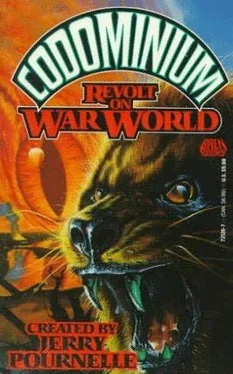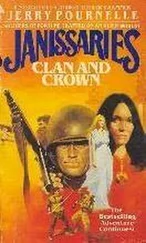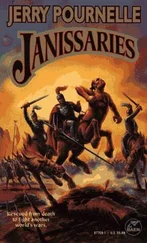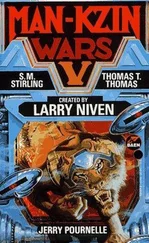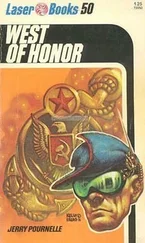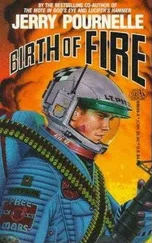Jerry Pournelle - Revolt on War World
Здесь есть возможность читать онлайн «Jerry Pournelle - Revolt on War World» весь текст электронной книги совершенно бесплатно (целиком полную версию без сокращений). В некоторых случаях можно слушать аудио, скачать через торрент в формате fb2 и присутствует краткое содержание. Жанр: Фантастика и фэнтези, на английском языке. Описание произведения, (предисловие) а так же отзывы посетителей доступны на портале библиотеки ЛибКат.
- Название:Revolt on War World
- Автор:
- Жанр:
- Год:неизвестен
- ISBN:нет данных
- Рейтинг книги:4 / 5. Голосов: 1
-
Избранное:Добавить в избранное
- Отзывы:
-
Ваша оценка:
- 80
- 1
- 2
- 3
- 4
- 5
Revolt on War World: краткое содержание, описание и аннотация
Предлагаем к чтению аннотацию, описание, краткое содержание или предисловие (зависит от того, что написал сам автор книги «Revolt on War World»). Если вы не нашли необходимую информацию о книге — напишите в комментариях, мы постараемся отыскать её.
Revolt on War World — читать онлайн бесплатно полную книгу (весь текст) целиком
Ниже представлен текст книги, разбитый по страницам. Система сохранения места последней прочитанной страницы, позволяет с удобством читать онлайн бесплатно книгу «Revolt on War World», без необходимости каждый раз заново искать на чём Вы остановились. Поставьте закладку, и сможете в любой момент перейти на страницу, на которой закончили чтение.
Интервал:
Закладка:
As for stickyleaf grass, our medics figured it out and explained it as a cousin to acid-secreting firegrass, but only after several emergencies left more than a few of us injured. One child, three and curious, had placed a sticky leaf on one of her eyes, and another had been eating them and died.
It was our first warning that Haven could, indeed, be very specifically an alien world into which we were the trespassers.
After that, we were all far more careful to take nothing for granted. Not even the soil in which I dug seemed as inert.
It seemed a trial of some kind, and I endured it by working even harder. I made the acolyte house extra secure by creating a zigzag entrance just big enough for one large man at a time to crawl through.
Nor was my dread of predators entirely unwarranted. A large part of our supplies, after all, consisted of the embryos of various foraging creatures, which we'd let loose. Once populations of these herbivores and omnivores thrived, we'd introduce the carnivores, a few of them, to act as predators and thus maintain a natural harmony.
An Earth-nocturnal cat from the Negev desert called a caracal, for example, was thought to be perfect for the dim lighting and relatively rainless conditions prevailing over most of Haven. It might raise havoc with our poultry, but could save grain from vermin, too. The high deserts and rugged mountains of our new homes would seem like paradise to such creatures, I thought. But encountering one might not be such a blessing.
Before any encounters might happen, though, there must be a thriving human settlement. On this world, man came first, bringing plants and animals with him, and although the harshness of the climate was a shock to many of us, even an insult, still, it was our place to be cautious.
In our hands lay Haven's fate, and we strove to be worthy of such responsibility.
In use lies ownership, and stewards of the land are keepers of the future, as our Writings tell us. On a more practical level, our church's resources had been spent to get us here, and the supplies we had were very likely all there would be. Haven's an out-of-the-way world, not on trade mutes and in fact on the very rim of the CoDominium's interests and influences. And so we struggled onward. How fragile we considered our every possession, how gently we treated even stones.
Our laying out of the encampment proceeded at a measured and deliberate a pace. A few of us might have hurried to escape the bitter winds, or to gain privacy or other comforts, but haste would have created its inevitable waste, and that might well have meant doom. Colonizing a world requires patience.
Castell supervised us, and kept us patient, and we remaining Chosen labored hard. We quickly patterned our habits so that there was always work being done, even as others rested. With only variable nights, Haven invited such perseverance.
In several of my sleepings we had a place that seemed familiar upon waking, and some of the quicker animals were beginning to take on proper forms, among them the chickens. I found out by almost trampling a dozen yellow chicks that hopped by just as I climbed the four steps up out of the acolytes house. To my look of surprise one of the genetics people said, "We let them breed a few cycles first, just to make sure."
"Then have you foodbirds?" I asked, my mouth watering.
He nodded. "Many have died, yes."
"Waste not, want not." Feeling lighter of step, I walked toward my day's duties. One of them was helping soothe the beasts to be slaughtered, by being among the chorus whose drones kept the birds calm even as the butcher graced each throat with his molecule-sharp, gently wielded blade.
Reverend Castell declared it Yule Season when he heard that meat was available. We celebrated with feasts and exchanged gifts of song, dance, and privacy. And our meals of roast chicken and eggs done many ways were, indeed, duly sanctified because we ate no meat that had not passed on its lifeforce first, and we ate no eggs that had not been candled and pronounced free of conception. Nature's cycles were kept in harmony.
Life began improving for us, as we harmonized with our new environment. Meetings were held again, as the work became predictable. Schools commenced classes. We sang, always we sang, and some began constructing instruments with which to enhance our music.
Once, as I sat with a group around a fire in the town square, the sound of a lone harmonica drifted to us from the woods. "The outcasts," someone said, and although a search was made, no one was found. Tales of the many odd items smuggled from Earth began to feature in our rest periods.
We contemplated the loss of regular dusks and dawns in one of Reverend Castell's sermons, and it moved us to think of the sacrifices sometimes necessary when better life beckons. On a more mundane level, shaving was largely forsaken, because facial and body hair added another layer of insulation, something to be cherished on chill Haven.
An influenza went through us at one point, giving most bouts of vomiting and fevers and worse, but no one died from it, and we pronounced it ship-borne, a legacy of lesser times, simpler tunes, when we'd lived in Earth's cacophony. Most negatives were blamed on Earth, while anything positive was a sign that Haven welcomed us, celebrated our arrival, and supported our efforts toward Universal Harmony.
Several women showed signs of pregnancy in the first months, and all would soon, we hoped. I often wondered when we acolytes would be permitted to choose wives from the girls, and I confess that I slept but fitfully all too often as I imagined this twelve-year-old, or that fourteen-year-old, naked and in my arms, her eagerness exactly matching mine, our knowledge equivalent as our bodies formed a chord.
Even Reverend Castell took a wife, Saral. His wedding was quiet and private, and she radiated both calm and good cheer when she stepped out of his house the morning after they'd plighted troth.
It was many sleeps before it dawned upon me that Saral was the woman who'd very likely been raped in the bunk beside me, during transport, and I could not help wondering if the Reverend had wed to save her from possible prejudice. Perhaps it was another of his lessons, too.
For a while we got along well, and bound ourselves in peace, but then the intruders came.
III
After a dozen Earth-months on Haven, I could go in shirtsleeves, and my body had filled out until I was bigger than Reverend Castell himself.
Walking between the rows of plastic-covered furrows, I crossed one of the fields north of town. The trick of covering the plants to create mini-greenhouse effects had increased our second crop yield by seventy percent, so I watched my feet, remembering clumsier days.
In my left hand I carried three small animals, all dead. They'd been discovered by three of our outlying farmers and I was taking them to the doctors for analysis. One looked like a salamander, green with red spots along its flanks, but it had a soft membrane across its forehead, and its eyes were multiplex, like a bee's.
Another of the animals I'd seen alive. It had a furlike covering that scraped off like moss, four legs, and twin tails with bristles at the end. Those bristles were more like tiny barbs, and caused swelling. I knew because I'd kicked one once, at the edge of a corn-crop.
Coming down the hill, I had a good view of the lake. Its beauty inspired me with pride at our world. Boats bobbed near the shore I approached, while our wharfs, now numbering three, showed much activity as nets were repaired and boats were sealed.
We used resin from the pinelike trees for a natural sealant, even inside our houses. It dried to resemble a plastic. Those trees, whose sap ran outside their trunk, added layer after layer in a seasonal cycle we had yet to parse. Resin could be harvested in liquid form, and kept pliant by heating, or it could be peeled in sheets.
Читать дальшеИнтервал:
Закладка:
Похожие книги на «Revolt on War World»
Представляем Вашему вниманию похожие книги на «Revolt on War World» списком для выбора. Мы отобрали схожую по названию и смыслу литературу в надежде предоставить читателям больше вариантов отыскать новые, интересные, ещё непрочитанные произведения.
Обсуждение, отзывы о книге «Revolt on War World» и просто собственные мнения читателей. Оставьте ваши комментарии, напишите, что Вы думаете о произведении, его смысле или главных героях. Укажите что конкретно понравилось, а что нет, и почему Вы так считаете.
